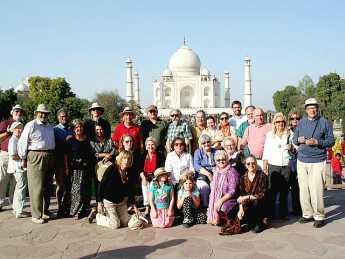Related Topics
Benjamin Franklin
A collection of Benjamin Franklin tidbits that relate Philadelphia's revolutionary prelate to his moving around the city, the colonies, and the world.

Old Age, Re-designed
A grumpy analysis of future trends from a member of the Grumpy Generation.
Right Angle Club 2011
As long as there is anything to say about Philadelphia, the Right Angle Club will search it out, and say it.
Favorites Podcasts
Recordings of Dr. Fisher's personal favorites.
Passage to India
.JPG)
|
| Palace on Wheels |
Journalists tactfully intone that India has fallen behind in its infrastructure. Translation: it's often at real risk of your life to cross a street. The Indian road system is overwhelmed by avalanches of rickshaws, tick tocks (motorcycle rickshaws), little cars, big cars, buses, trucks, and motorcycles. All vehicles seem to be driven by teenaged maniacs, honking their horns and driving straight at you; the motor accident rate in India is among the worst in the world. It's not just a statistic. One tour bus we were riding bashed into a motorcyclist, and just kept on going even though the passengers yelled and banged on the windows. Conclusion: airplanes and trains are the only reasonably comfortable ways to travel in India today. In another twenty years, things will surely improve or India must strangle, but right now you better save your pennies to afford the Palace on Wheels. That's a tourist train making a big continuous loop through the main tourist attractions of central India, beginning and ending in New Delhi every Wednesday.

|
| Taj Mahal |
You would have to be pretty aloof to avoid acknowledging the other seven passengers who share a sleeping car with you: four bedrooms, two houseboys, and a living room. And you soon enough know the busload (thirty passengers) in your guide group. Ours was the Pink Group, definitely not named for its political leanings. With the passengers from four bedroom cars, you also share a bar car, arranged in a facing circle of overstuffed furniture, (just as you see extended families in Bollywood movies), a sitting in one of the dining cars, and one tour bus with a Pink sign in the window. Thus organized, the twenty-car train with three trailing buses carries a hundred tourists with well-practiced efficiency in the style which claims to treat each passenger as a maharajah. It is true these modern rajahs do not have three hundred concubines or twelve wives, as the real ones did. But the briefest reflection confirms that no sane man would want twelve wives or more than, say, twenty concubines. So the tourist's condition could in a way be held superior to that of any real maharajah. The central point at the moment, however, is that the arrangement of this brief collection of strangers lends itself to gossip and reckless self-description, sort of like a rolling girls' boarding school. There's really nothing much to talk about except each other, and only eight members in the conversation group.

|
| The Pink Group |
While it was hard to overlook the mixed-ethnicity elderly couple in our midst, it was, of course, the ladies of the party who quickly assembled the essential bits of intelligence available. These two, an elderly Indian man with a broad smile and broader paunch, plus a thin wisp of a little white lady with the grace and social command of a duchess, had been friends in a Canadian nursing home where their children had placed them, had both lost their spouses, and then eloped to freedom. By escaping from the hateful nursing home they saved $9000 a month, so it really must have been a pretty upscale CCRC, or retirement village. In Canada, there is lots of snow, cozy like an igloo all winter, but unquestionably confining. A little bit of scientific background allowed me to estimate the life expectancy of these two to be about eight more years, or perhaps seven if you subtract the dismal last year that everyone should be glad to skip. These two had apparently counted up their resources, found they could afford better things than a nursing home and decided to make a dash for freedom to spend their last seven years in playland while they had the chance. The ladies in our group obviously thought this adventure was just about the most exciting thing ever and grinned approvingly at every new detail. Although our travel group overall seemed to have its fair share of boors, no one, absolutely no one was boorish enough to ask if there had been a wedding.
Like pimpled teenagers, the two would slip their hands together with the hope that if they didn't look at their hands, no one else would notice. So, from time to time, the gentleman would slide his hand onto her thigh. And she, with the practiced skill of a high school cheerleader, would wait thirty seconds and with a big smile aimed at no one in particular, brush his hand away. She was having a perfectly wonderful time because she knew very well that every other lady was watching every movement.

|
| Palace Train |
At about the same age, Ben Franklin once moved with the fast set in Paris in his eighties. In fact, Franklin probably moved with a fast set wherever he was at any age. He seldom discussed the topic directly except in that famous letter to his son which concluded, "And son, they are so grateful". In our present society which claims such infinite sophistication, Ben might now have expanded on the misdirected pressures of inheritance laws which thwart re-marriages. Or on new-found freedom, the age-related indifference to complicating children, which some couples miss more than others. In fact, Franklin's famous letter to his (illegitimate) son enumerates a list of other advantages of love affairs with older women which could just as easily have been listed by John Milton or Cotton Mather. At least one gentleman has given the opinion that Franklin was all mischievous talk and no action. But I dunno. That remark about how grateful they are surely carrying some implication of personal experience.
Originally published: Monday, February 14, 2011; most-recently modified: Friday, September 20, 2019